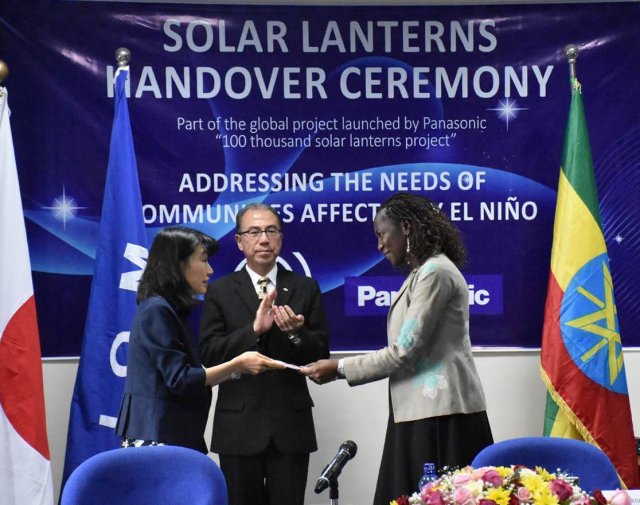
Jan 29, 2026
- Products & Solutions
- Stories
- Technology
- AI & Robotics
- R&D
- Business Solutions
- Operating Company

Panasonic Corporation has donated 2,400 solar lanterns to the International Organization for Migration (IOM) Special Liaison Office in Ethiopia. A donation ceremony was held on July 14, 2016, with key persons present, including Ms. Maureen Achieng, Chief of the Mission and Representative to the African Union, IGAD and UNECA, and H.E. Mr. Kazuhiro Suzuki, Ambassador Extraordinary and Plenipotentiary of Japan to Ethiopia.
Addis Ababa, Ethiopia - At the ceremony, Ms. Achieng said that displacements often occur in rural areas where there are no or limited social and basic services and among displaced populations, women, children and the elderly are particularly vulnerable to various types of hazards en route and at their sites of displacement. She also said that this donation of lanterns would give these communities precious light, and that she hopes this example will strengthen partnership between the government, humanitarian organizations and private sector. She expressed heartfelt appreciation on behalf of the IOM and people who will benefit from the donation. Ambassador Suzuki said this donation could be a new model for partnership between international organizations and the private sector for the socioeconomic development of African countries.
The solar lanterns donated will be used in 120 locations with IDPs in three regional states, including health posts, youth centers, and community policing stations, and it is hoped that they will help improve the quality of life for people in the areas of health, education, and safety.
The 100 Thousand Solar Lanterns Project was launched in fiscal 2012, and by the end of March 2016 a total of 61,000 lanterns had been donated to 17 countries in Africa and Asia, including Cambodia, India, and Myanmar. In Africa, about 11,000 lanterns have already been donated to eight countries, and this was our first donation to Ethiopia.
Panasonic will further accelerate its efforts under the 100 Thousand Solar Lanterns Project so that it may successfully donate 100,000 units by 2018, its 100th anniversary, and strengthen efforts to contribute to the achievement of Sustainable Development Goals (SDGs), adopted by world leaders at the United Nations in September 2015.
The "100 Thousand Solar Lanterns Project" is one of Panasonic's corporate citizenship activities that utilize products it manufactures. More than 1.2 billion people worldwide still live without access to electricity*. The lack of electric lighting severely impacts health, education, income-generation and safety at night. Panasonic hopes to help alleviate the social challenges faced by people living without access to electricity in developing and emerging countries, and to bring positive change to their lives by donating these small lighting devices powered by solar energy. Panasonic has also donated solar lanterns to give relief to communities stricken by large-scale natural disasters or by epidemics.
Panasonic aims to donate 100,000 solar lanterns under this project by 2018, the 100th anniversary of the company's founding. In principle, recipients are non-profit, non-governmental, humanitarian and international organizations. So far, 80 organizations in 17 countries have received these solar lanterns. Reports from these organizations indicate that they have been put to effective use for various activities, including children's studies, literacy education for adults, safer childbirth and medical treatment, and income generation.
* Source: International Energy Agency (IEA), World Energy Outlook 2015
Disclaimer:
We would like to note that Panasonic Newsroom is not a place to address personal Customer Service issues. Even though this is not the forum, Panasonic is always eager to resolve your concerns. Our local customer services contacts can be found at http://www.panasonic.com/global/support.html or you can see our list of Social Media Accounts to find the right channel for your queries and concerns here http://news.panasonic.com/global/socialmedia/.
The content in this website is accurate at the time of publication but may be subject to change without notice.
Please note therefore that these documents may not always contain the most up-to-date information.
Please note that German, Spanish and Chinese versions are machine translations, so the quality and accuracy may vary.